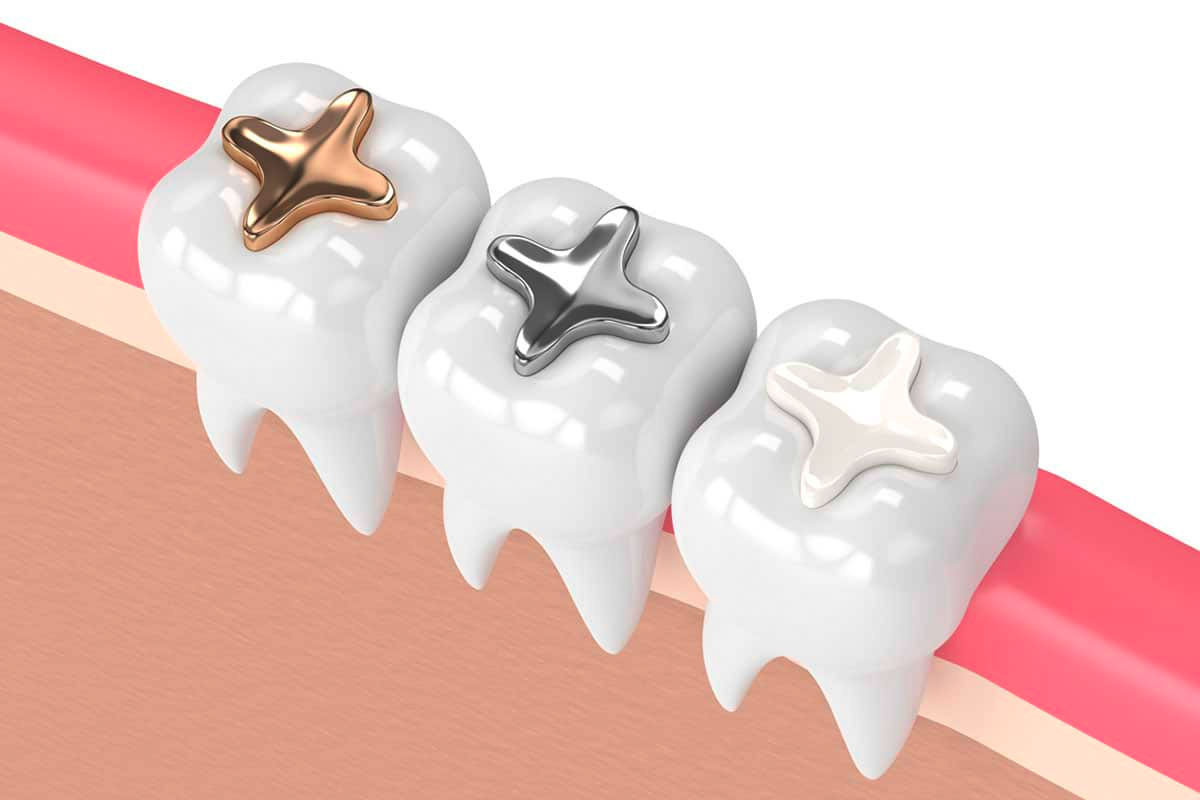Dental fillings play a crucial role in restoring teeth damaged by decay or trauma. It can also help prevent further deterioration and the need for more invasive treatments. Understanding the different options available and making an informed decision is essential to maintain optimal dental health.
Types of Dental Fillings
When it comes to dental fillings, you have several options, each with its own advantages:
- Amalgam Fillings: These silver fillings, made of various metals, are safe and durable, often used for larger cavities in the back teeth.
- Composite Fillings: Crafted from tooth-coloured resin, these fillings blend naturally with your teeth, making them ideal for visible areas and small to medium-sized cavities.
- Ceramic Fillings: Also known as porcelain fillings, they offer strength, resistance to staining, and great aesthetics, commonly used for larger cavities in visible parts of your mouth.
- Glass Ionomer Fillings: These combine glass and organic acid and release fluoride, making them suitable for small to medium-sized cavities, especially in children.
- Gold Fillings: Although expensive and requiring multiple visits, gold fillings are known for their durability and longevity.
Signs that You May Need a Dental Filling
Wondering if you need a dental filling? Keep an eye out for these telltale signs of cavity development:
- Toothache: Ongoing or occasional tooth pain, especially during meals or drinks, could be a sign of tooth decay, necessitating a dental check-up.
- Sensitivity: Heightened sensitivity to hot, cold, or sweet foods and beverages may indicate the presence of a cavity, so it’s wise to consult your dentist for an assessment.
- Visible Holes or Dark Spots: If you spot a hole or dark spot on your tooth, it’s a likely indicator that decay has progressed to the point where filling is required—time to schedule a dental appointment.
- Pain or Discomfort While Chewing: If you experience discomfort or pain while biting or chewing, it could be a cavity that needs filling. Don’t ignore this symptom, as untreated cavities can worsen.
- Persistent Bad Breath: Chronic bad breath can stem from tooth decay since cavity-causing bacteria produce unpleasant odours. If you have ongoing bad breath, reach out to your dentist for an evaluation.
If you notice any of these signs or symptoms, don’t hesitate—book an appointment with your dentist promptly. Detecting and addressing cavities early can prevent more extensive damage and the need for invasive and costly procedures.
The Dental Filling Process
Now that you understand different types of dental fillings and how to spot when you might need one, let’s look at the filling procedure itself. Knowing what happens can ease any worries you might have.
- Initial Checkup: A dentist will look at your teeth, possibly use X-rays, and talk to you about your symptoms. This helps them decide if you need a filling and which type is best.
- Getting Ready: If you need a filling, your dentist will first numb the area around the tooth with a local anaesthetic. Once it’s numb, they’ll use a drill or laser to remove the damaged part of the tooth. Then they’ll clean and shape it for the filling.
- Filling Placement: After preparing the tooth, your dentist will put the filling material in layers, using a special light to harden each layer. This layering makes sure the filling sticks well to the tooth. When it’s done, your dentist will shape and polish it for a comfortable fit and a natural look.
Aftercare and Maintenance of Dental Fillings
Once your dental filling procedure is complete, it’s crucial to provide proper care to ensure its longevity. Here are some essential aftercare tips for dental fillings:
- Practice Excellent Oral Hygiene: Brush your teeth at least twice a day with fluoride toothpaste and make daily flossing a routine. This diligent oral hygiene helps prevent further decay and prolongs the life of your dental filling.
- Avoid Excessive Pressure: Steer clear of biting down on hard objects like ice or pens, as this can harm the filling. If you have a nighttime teeth grinding habit, your dentist may recommend a nightguard to safeguard your dental work.
- Attend Regular Dental Check-Ups: Consistent dental check-ups are vital for sustaining optimal oral health. Your dentist will monitor the condition of your fillings and detect any potential issues early on.
- Be Alert to Warning Signs: Stay attentive to any alterations in your dental filling, such as increased sensitivity, discomfort, or rough edges. If you observe anything unusual, promptly reach out to your dentist for evaluation.
Richmond Dental Centre Accepting New Patients
Are you looking for a local dentist in the city of Richmond? The Dental Professionals at Richmond Dental Centre welcomes walk-ins, emergencies & new patients! Give us a call at (604) 273-3368 to schedule a dental appointment.







